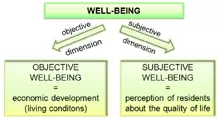Health and well-being are closely related concepts, but they shouldn't be confused with each other. In this article, we'll explore the distinction between the two and why it matters for our overall wellness.
What is Health?
Health can be described as the state of being free from injury or illness. When it comes to physical health, it means having a body that is strong, capable, and free of disease. On the other hand, mental health refers to having a mind that is strong, capable, and free of disease. When we are mentally healthy, we can navigate life's challenges without being overwhelmed by stress, frustration, anxiety, or sadness. It's important to note that physical and mental health go hand in hand and impact every aspect of our lives.
The Meaning of Well-being
While health is primarily concerned with the absence of illness, well-being encompasses a broader perspective. Well-being involves maintaining physical, mental, and emotional stability and balance, not just the absence of negative factors. In scientific terms, there are two types of well-being: objective and subjective.
Objective well-being is based on fulfilling basic human needs such as food, education, health, safety, and shelter. It fluctuates with social, cultural, and political events and can be measured by self-reporting overall well-being. On the other hand, subjective well-being is measured by how individuals feel about their well-being. It includes factors like satisfaction, social well-being, happiness, and a sense of meaning. When objective and subjective well-being come together, they create an overall sense of wellness.
 Image Source: [source link]
Image Source: [source link]
The Importance of Health and Well-being
Maintaining good physical and mental health is crucial because it allows us to function at our highest potential. When our health and well-being are lacking, it affects every aspect of our lives, both personal and professional. One significant obstacle to our well-being is stress.
The Effects of Stress on Health and Well-being
Stress is a common factor that impacts our overall health and well-being. It seeps into all areas of our lives, including our relationships and personal well-being. Work-related stress is particularly prevalent, with 64% of employees reporting frequent stress or frustration in their jobs.

Image Source: [source link]
High stress levels not only affect employees' personal lives but also have a significant economic impact on businesses. Stressed and frustrated employees are absent from work more often, less productive, and less profitable compared to their counterparts. This kind of chronic stress contributes to a decline in both the physical and mental health of employees.
In recent years, some tech companies have faced criticism for their treatment of employees, with reports of demanding company goals and policies leading to excessive stress. The resulting increase in injuries and exhaustion rates has a detrimental effect on employee health and well-being. Shockingly, 94% of American workers report experiencing extreme stress at their jobs, leading to about $190 billion in healthcare costs each year.
It's important for companies to prioritize employee wellness to address these issues. However, the modern workplace still poses significant challenges to the health and well-being of workers. Finding effective ways to manage stress and promote overall wellness is essential in today's fast-paced, high-pressure work environments.
In conclusion, while health and well-being are interconnected, they have distinct meanings. Health focuses on the absence of illness, while well-being encompasses a broader spectrum of physical, mental, and emotional stability and balance. Prioritizing both our health and well-being is essential for leading fulfilling and successful lives.


















